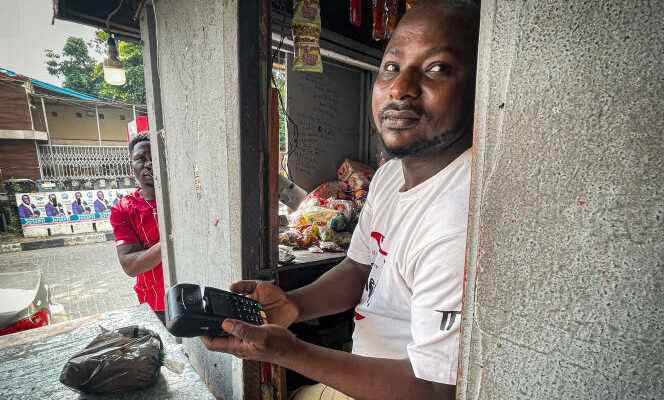To not miss any African news, subscribe to the newsletter of the “World Africa” from this link. Every Saturday at 6 a.m., find a week of news and debates covered by the editorial staff of the “World Africa”.
The announcements of the Central Bank of Nigeria (CBN) on Tuesday, December 6, created a shock wave to the Nigerian Parliament, in Abuja. The elected officials are questioning the decision to limit withdrawals to 20,000 naira (about 42 euros) per day and 100,000 naira per week for individuals, and 500,000 naira (about 1,068 euros) for businesses. With the entry into force of this new regulation on January 9, any withdrawal above this limit will incur fees ranging from 5% to 10%.
Some parliamentarians criticize a measure ” drastic “announced “overnight” and “without consultation”but which could have serious consequences, “especially for the inhabitants of rural areas where all transactions are made in cash”. Faced with this outcry, the powerful governor of the CBN wanted to calm things down by indicating that the limit could possibly be reviewed.
“We are doing this for the good of the economy and its development,” said Godwin Emefiele, after a meeting with President Muhammadu Buhari, who gave him his support. “We’re not going to be too rigid, but that doesn’t mean we’re going to give up,” he specified.
Since 2011, the issuing institute seeks to modernize payment systems, encouraging the population to favor electronic uses, whether for money transfers by mobile phone or payments by bank card. Now, the goal is also to encourage the adoption of eNaira – the digital currency launched just over a year ago. Thanks to these tools, the CBN intends to achieve 95% financial integration by 2024, while at the end of 2021 only 64% of adults had access to the banking system in the most populous country in Africa (220 million inhabitants). ).
“Mini-banks” at merchants
“The idea is to distribute these tools in the regions that are currently the most isolated, comments Olaolu Boboye, economist for CardinalStone in Lagos. An average Nigerian owns at least a basic mobile phone, with which he can transfer small amounts using a USSD code. The eNaira also showed encouraging results, even if they are below initial expectations. More generally, this measure will open up additional opportunities for Fintech. »
Mr. Boboye says that when he was a student, he had to travel miles to withdraw money in the nearby town. Now based in Lagos, he says he has not used an ATM for two years. “It would cost me around 200 naira to get to the one closest to my home, he justifies. And, often, there are long queues or there are no tickets in the machines. » Instead, Olaolu Boboye withdraws in a ” point of sale “ (Point of Sale, POS), that is to say from a merchant with a bank terminal.
Wedged in his tiny shop filled with bags of bread and sachets of powdered milk, Nuhu slips crumpled notes to the customer who made a money transfer to him the day before. “I came to collect 27,000 naira, says the latter. It would take me way too long to go to the bank. It’s much more convenient to come here. I don’t mind the 200 naira commission I have to pay to use this POS. »
These “mini-banks” have sprung up on every street corner over the past decade, creating a source of income for thousands of families. But the directives of the Central Bank may well put an end to this activity. “If I can only withdraw 20,000 naira a day, I will be forced to quit,” confirms Nuhu.
A confusing and unpredictable situation
This new withdrawal ceiling is likely to particularly affect small businesses, at the heart of the Nigerian economy. “The mobile network is too bad. Alerts indicating a money transfer can sometimes take two hours to arrive, says Jordan, another Nuhu client. No one has time to waste on that! » These announcements could also “undermine confidence in a banking system deemed obsolete and push people to withdraw as much money as possible to make reserves”, according to Tunde Ajileye, analyst for SBM intelligence, who also warns against “a possible shift in demand to the black market”.
The situation is all the more confused and unpredictable as the Central Bank also announced at the end of October that the banknotes currently in circulation will be replaced. Nigerians have until January 31 to get their cash back in the bank and get new banknotes, before the old ones become obsolete. This announcement caused a run on the dollar and the vertiginous fall of the naira on the parallel foreign exchange market in the days that followed.
Officially, it is to regain control of liquidity, while 80% of currencies in circulation would be outside banks, according to official statistics. The Central Bank thus hopes to better control inflation, put a stop to money laundering and counterfeiting, and… limit vote buying, on the eve of the presidential election of February 25, 2023.
Except that “timing and haste” of these announcements may ” Ask a question “, according to Tunde Adjileye. Perhaps the CBN is trying to “limit demand to avoid having supply problems” into new banknotes? Especially since the printing of these new denominations is very expensive. For his part, Governor Godwin Emefiele assures that the banks have already received the new banknotes and that they are ready to begin their distribution.
